外研版高中英语必修三Module5PeriodThreeIntegratingSkills.docx
高一英语外研版必修3教案: Module5Period5 含解析 精品
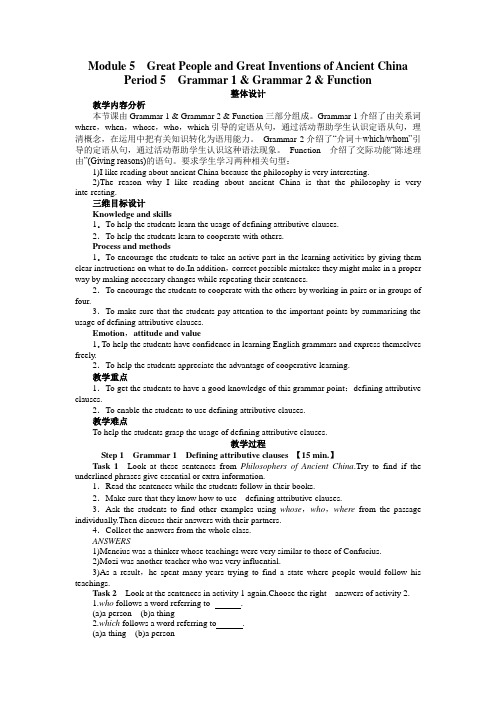
Module 5Great People and Great Inventions of Ancient China Period 5Grammar 1 & Grammar 2 & Function整体设计教学内容分析本节课由Grammar 1 & Grammar 2 & Function三部分组成。
Grammar 1介绍了由关系词where,when,whose,who,which引导的定语从句,通过活动帮助学生认识定语从句,理清概念,在运用中把有关知识转化为语用能力。
Grammar 2介绍了“介词+which/whom”引导的定语从句,通过活动帮助学生认识这种语法现象。
Function 介绍了交际功能“陈述理由”(Giving reasons)的语句。
要求学生学习两种相关句型:1)I like reading about ancient China because the philosophy is very interesting.2)The reason why I like reading about ancient China is that the philosophy is very inte-resting.三维目标设计Knowledge and skills1.To help the students learn the usage of defining attributive clauses.2.To help the students learn to cooperate with others.Process and methods1.To encourage the students to take an active part in the learning activities by giving them clear instructions on what to do.In addition,correct possible mistakes they might make in a proper way by making necessary changes while repeating their sentences.2.To encourage the students to cooperate with the others by working in pairs or in groups of four.3.To make sure that the students pay attention to the important points by summarising the usage of defining attributive clauses.Emotion,attitude and value1.To help the students have confidence in learning English grammars and express themselves freely.2.To help the students appreciate the advantage of cooperative learning.教学重点1.To get the students to have a good knowledge of this grammar point:defining attributive clauses.2.To enable the students to use defining attributive clauses.教学难点To help the students grasp the usage of defining attributive clauses.教学过程Grammar 1Defining attributive clauses 【15 min.】Task 1Look at these sentences from Philosophers of Ancient China.Try to find if theunderlined phrases give essential or extra information.1.Read the sentences while the students follow in their books.2.Make sure that they know how to use defining attributive clauses.3.Ask the students to find other examples using whose,who,where from the passage individually.Then discuss their answers with their partners.4.Collect the answers from the whole class.ANSWERS1)Mencius was a thinker whose teachings were very similar to those of Confucius.2)Mozi was another teacher who was very influential.3)As a result,he spent many years trying to find a state where people would follow his teachings.Task 2Look at the sentences in activity 1 again.Choose the right answers of activity 2.1.who follows a word referring to .(a)a person(b)a thing2.which follows a word referring to.(a)a thing(b)a person3.Instead of which you can say .(a)who (b)that4.where follows a word that refers to .(a)place (b)time5.when follows a word that refers to .(a)place (b)time6.whose means .(a)of whom (b)who1.Ask the students to complete this activity individually.Then they can discuss their answers with their partners.2.Collect the answers from the whole class.ANSWERS1.a2.a3.b4.a5.b6.awith their partners.2.Collect the answers from the whole class.ANSWERS1.E2.A3.B4.C5.Dwith their partners.2.Collect the answers from the whole class.ANSWERS1.which2.where3.when4.whose5.whose6.when7.whereGrammar 2 Defining attributive clauses :of whom ,in which 【18 min.】with their partners.2.Collect the answers from the whole class ,as complete sentences.ANSWERS1.C2.D3.B4.ATask 2 Underline the words that are different in each pair of sentences.1.Ask the students to complete this activity individually.Then they can discuss their answerswith their partners.2.Collect the answers from the whole class.ANSWERS1)identical2)identical3)was used/appeared in4)identicalTask 3Rewrite these sentences as in the examples in activity 1.1.The man who(m) I am thinking of invented the first real clock.2.These are the leaves which silk is made from.3.He is a person who(m) everyone has heard of.4.This is the house which the inventor lived in.1.Ask the students to complete this activity individually.Then they can discuss their answers with their partners.2.Collect the answers from the whole class.ANSWERS1.The man of whom I am thinking invented the first real clock.2.These are the leaves from which silk is made.3.He is a person of whom everyone has heard.4.This is the house in which the inventor lived.(These sentences are very formal;native speakers never say so.)with their partners.2.Collect the answers from the whole class.ANSWERS1.We're in the region in which printing was first invented.2.It's an invention of which he is very proud.3.He is a man of whom I am afraid because he has invented something very dangerous.4.The machine at which you are looking is very old.5.Is that the inventor to whom you were talking.1.where2.who3.whose4.whichFunction 【10 min.】Task 1Look at these sentences.Underline the words that are the same in both sentences.1.Read out the two examples while the students follow in their books.1)Mencius believed that the reason why man is different from animals is that man is good.2)Often,the reason why people are unhappy is that they do not have enough love.2.Ask the students to underline the common words individually.Then they can discuss their answers with their partners.3.Collect the answers from the whole class.ANSWERSthe reason/why/is/thatTask 2Rewrite the sentences.1.We remember the ancient philosophers because their ideas are important.2.I bought the book because it is about philosophy.3.Mencius resigned because the ruler was not following his advice.4.Mozi hated the idea of war because he thought people should not kill each other.1.Read out the four sentences while the students follow in their books.2.Ask the students to do the activity individually.Then they can discuss their answers with their partners.3.Collect the answers from the whole class.Show the answers on the screen or write them on the blackboard.ANSWERS1.The reason why we remember the ancient philosophers is that their ideas are important.2.The reason why I bought the book is that it is about philosophy.3.The reason why Mencius resigned was that the ruler was not following his advice.4.The reason why Mozi hated the idea of war was that he thought people should not kill each other.Making a summary 【2 min.】Summarise the whole period.First,emphasise the usage o f defining attributive clauses.Then sum up the features of the connectives:where,when,whose,who,which.HomeworkDo the exercise 1 and 2 on page 91.教学参考One Great Invention of Ancient China—Printing●Block PrintingWith the inventions of paper and ink,stamper gradually became popular during the Jin Dynasty(265-420),which was the early form of Carved Type Printing.Block Printing first appeared in the Tang Dynasty(618-907).The text was first written on a piece of thin paper,then glued face down onto a wooden plate.The characters were carved out to make a wood-block printing plate,which was used to print the text.Wood-block printing took a long time as a new block had to be carved for every page in a book.It took a lot of time and energy as well as materials to prepare for printing a book,but it worked more effectively afterwards.This technology was gradually introduced to Korea,Japan,Vietnam,and the Philippines.Yet,Block Printing had its drawbacks—all the boards became useless after the printing was done and a single mistake in carving could ruin the whole block.The frontispiece of the world's oldest surviving book,The Diamond Sutra printed in the year 868,was discovered at Dunhuang Cave,along the Silk Road.The book,in the form of a roll,is the earliest woodcut illustration in a printed book.●Movable Type PrintingBlock Printing was a costly and time-consuming process,for each carved block could only be used for a specific page of a particular book,besides,a single mistake in carving could ruin the whole block.However movable type printing changed all of that.In the Song Dynasty(960-1279),a man named Bi Sheng carved individual characters on identical pieces of fine clay.Each piece of movable type had on it one Chinese character which was carved in relief on a small block of moistened clay.After the block had been hardened by fire,the type became hard and durable and could be used wherever required.The pieces of movable type could be glued to an iron plate and easily detached from the plate.Each piece of character could be assembled to print a page and then broken up and redistributed as needed.When the printing was finished,the pieces were put away for future use.By the year 1000,paged books in the modern style had replaced scrolls.Two colour printing (black and red) was seen as early as 1340.This technology then spread to Korea,Japan,Vietnam and ter,German Johann Gutenberg invented movable type made of metal in the 1440s.Movable Type Printing developed very fast.Based on clay type,type made of wood,lead,tin and copper gradually appeared.。
外研版高中英语必修第三册 Module 5 Listening and speaking课件(15页ppt)
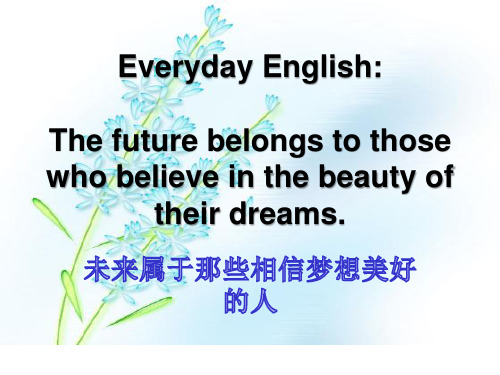
外研版高中英语必修第三册 Module 5 Listening and speaking课件(15页ppt)
下节预告: 教学内容:Grammar2 & writing 预习内容:Page49,Module 5,
Book 3
外研版高中英语必修第三册 Module 5 Listening and speaking课件(15页ppt)
1. To set up a very strict law to prevent people from keeping and eating wildlife. 2. To keep a harmonious relationship with wildlife so as not to break the ecological balance of nature(the balance of ecosystem).
外研版高中英语必修第三册 Module 5 Listening and speaking课件(15页ppt) 外研版高中英语必修第三册 Module 5 Listening and speaking课件(15页ppt)
外 研 版 高 中 英语必 修第三 册 M od ule 5 L iste ning a n d s pe aking课 件(15 页ppt)
Speaking Topic: Share with us a person or a moment around you or you have heard of , which touces you in this special period. You can either write it down ,then read it out. or do an oral presentation.
高中英语Module5教案外研版必修3
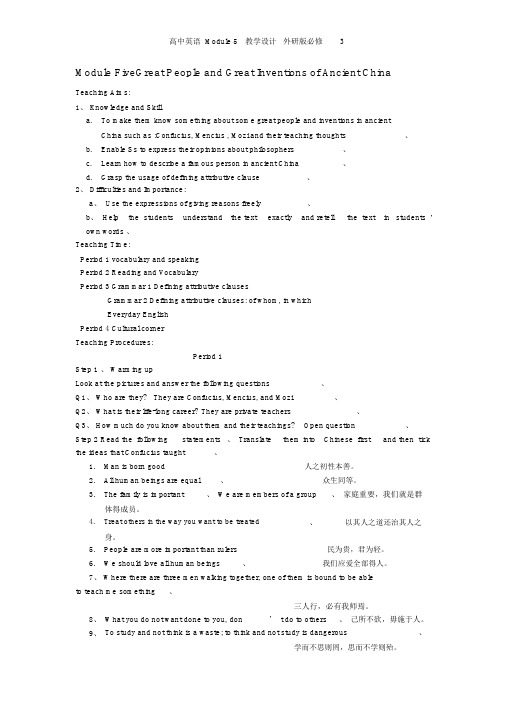
高中英语 Module 5教学设计外研版必修 3Module FiveGreat People and Great Inventions of Ancient ChinaTeaching Aims:1、 Knowledge and Skilla.To make them know something about some great people and inventions in ancientChina such as :Confucius, Mencius , Mozi and their teaching thoughts 、b. Enable Ss to express their opinions about philosophers 、c. Learn how to describe a famous person in ancient China 、d. Grasp the usage of defining attributive clause 、2、 Difficulties and Importance:a、 Use the expressions of giving reasons freely、b、 Help the students understand the text exactly and retell the text inown words 、Teaching Time:students ’Period 1 vocabulary and speakingPeriod 2 Reading and VocabularyPeriod 3 Grammar 1 Defining attributive clausesGrammar 2 Defining attributive clauses: of whom, in whichEveryday EnglishPeriod 4 Cultural cornerTeaching Procedures:Period 1Step 1 、 Warming upLook at the pictures and answer the following questions、Q1、 Who are they? They are Confucius, Mencius, and Mozi、Q2、 What is their life-long career? They are private teachers、Q3、 How much do you know about them and their teachings? Open question、Step 2 Read the following statements、Translate them into Chinese first and then tick the ideas that Confucius taught、1. Man is born good人之初性本善。
高中英语(外研版)必修三配套课件:Module+5+Period+4+Integrating+Skills+要点讲解课+情境互动课型1
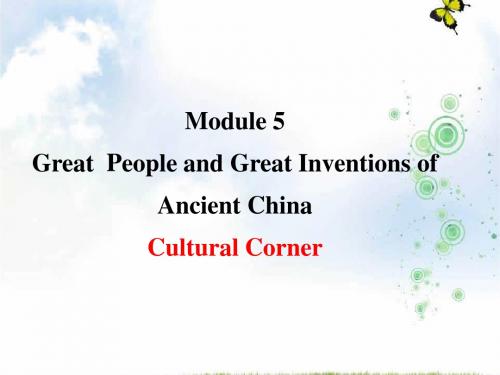
Careful reading
Step 1. Ans 1. When did the Industrial Revolution start?
In the second half of the 18th century.
2. Before that, what kind of society did Europe belong to? A farming society.
虽然是旧车但车况良好。
You can go out to play on condition that you finish your homework. 完成作业你才能出去玩。
Homework
Get more information about the Industrial Revolution.
People’s lives
Europe
China
Language points
condition n. 条件,情形,环境,状况
Often, factory workers lived in poor and crowded
conditions. 工厂的工人经常生活在贫困、拥挤的环境中。
【知识拓展】
Revolution.
Leading - in
James Watt
Steam engine
Pre - reading
1. What do you know about The Industrial Revolution? 2. Where did it start first?
欧洲工业革命
通常指欧洲资本主义的机器大工业代替以手
Step 2: Listen to the passage and decide whether
英语必修ⅲ外研版module5教案5

(2)字尾元音+字首元音
在两个元音之间也可产生连读现象 如 we are, I am, the outside。如:
Thank you for coming to see me-off.
I went to the station to see her-off.
Go on
One possible version:
Advantages and disadvantagesofTV
Nowadays more and more people like to watch TV. So TV plays a very important part in our life. But TV has both advantages and disadvantages. Generally, the advantages can be listed as follows.
Para 1:
Nowadays more and more people…/…plays an important part in… like everything else, ...has/have both favorable and unfavorable aspects/both advantages and disadvantages. Generally, the favorable aspects/advantages can be listed as follows.
教学程序
教学内容(引入、例题、练习题、检测题等)
师生
活动
时间分配
Step 1
Step 2
Step3
Step 4.
Step 5
外研版高中英语必修第三册Unit 5 Section Ⅲ Using language
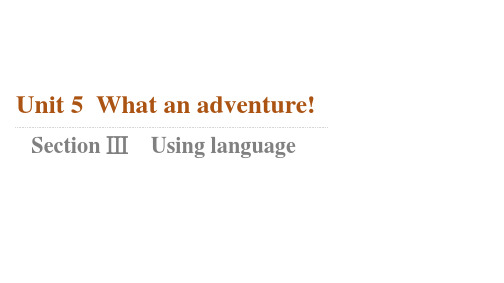
alcohol.
酒__
3. She tells the reporter that Yugur clothes are usually made from
silk or cotton.
棉__花__
4. Seeing the player's left knee bleeding, a trainer immediately
③Alan Arnette, who climbed Qomolangma in that year and was going to climb other high mountains around the world.
④Yet, despite all this, by the end of the trip many were already planning to return.
4. 句型公式:keep+宾语+宾语补足语 It's important _to__k_e_e_p_t_h_e_a_r_m__s_ti_ll_a_n_d__ri_g_id__. 保持手臂静止不动很重要。
过去将来时 ①Last year, hundreds of people spent good money on an experience that they knew would include crowds, discomfort and danger. ②Many would become sick, due to the extreme cold and low air pressure, and a few would even lose their lives.
4. _b_l_ee_d_i_n_g_ n. 流血,失血→bleed v. 流血→blood n. 血,血液; 血统→bloody adj. 出血的,血染的;血腥的,残暴的
高中英语外研版必修三《Module5Reading Great People andGreat In
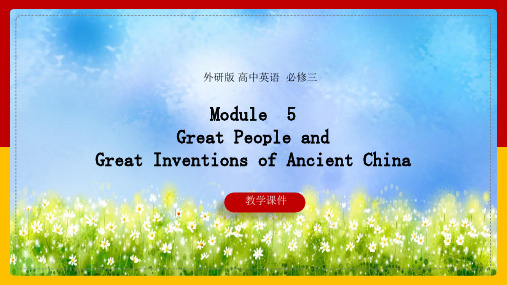
electric light 电灯
Thomas Edison
gramophone 留声机
Great western inventors and inventions in history.
Alexander Bell
telephone
Great western inventors and inventions in history.
However, we do know that in 1092 AD he invented the first real clock. For the first time, it became possible to tell the tim. e 3.They say that a man called Cai Lun made paper from the bark of a tree in about 105AD. If so , he is a man of whom China can be proud. 4. The book in which printing first appeared was called the Diamond Sutra. 5. It was not until 1454 that the first book was printed in Europe.
1. China was the first county to invent silk.
T
not
2. Su Song, who invented the first clock to tell the time, is well-
known to us.
F
3. It was Bi Sheng who invented paper .
外研社高一英语必修三 module 5精品PPT课件

All man are __e_q_u_a_l___ . love all _h_u_m__a_n__b_e_i_n_g_s_ and look after the weak hate the idea of __w__a_r_
A. Mencius B. Mozi
C. Confucius D. Zhuangzi
2. Confucius stressed the importance of the following aspects except__B________
A. Kindness Bபைடு நூலகம் friendship
C. order
Module 5
Great People and Great Inventions of Ancient China
1.Exploring the old and deducing the new makes a teacher.
温故而知新,可以为师矣 。
2. To learn without thinking is labor in vain, to think without learning is desolation. 3. K学n而o不wl思ed则ge罔is,n思ot而e不qu学al则to怠d。evotion. Devotion is not equal to joy.
D. duty
3. Which is NOT the right statement about Mozi? C
A. He was known for his unusual clothes and behavior.
B. He hated the idea of war.
【新教材】高中英语外研版必修第三册: Unit 5 全章课件
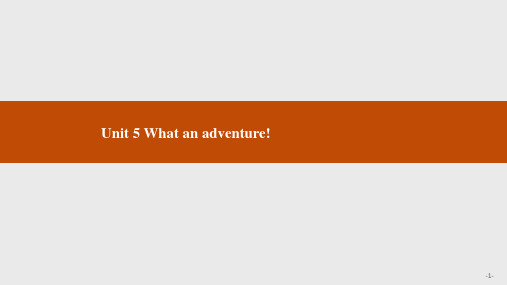
【词汇拓展】 It has been confirmed that ...据证实……;已经确认…… confirm sb as...任命某人为…… confirmation n.证实;证明;确认 It has been confirmed that the celebrating party will be held next Friday. 已经确定庆祝晚会将在下周五举行。 He was confirmed as captain for the rest of the season. 他被正式任命在这个赛季剩下的一段时间内担任队长。
【词汇拓展】 a crowd of一群;许多 crowd in (on sb)挤进;涌上心头 crowd into挤入…… crowded adj.拥挤的 be crowded with挤满……
On getting off the plane,the famous star was surrounded by a crowd of fans. 这位著名的明星刚一下飞机就被一群影迷围住了。 She tried to sleep,but thoughts crowded in and images flashed into her mind. 她想睡觉,但头脑中想法不断涌现,画面一一闪现。 We all crowded into her office to sing “Happy Birthday”. 我们全都涌进她的办公室,唱“生日快乐”。 The stadium was crowded with excited people waiting for their favourite player. 体育场里挤满了激动的人,等待他们最喜欢的球员。
重点词汇 1.The first people confirmed to have reached the top were Edmund Hillary and Tenzing Norgay in 1953.(教材P50) 1953年,埃德蒙·希拉里和丹增·诺尔盖首次确认登顶。 【词汇精讲】本句中confirm 是及物动词,意为“证实,确认”,宾语可 以是名词、代词或that从句。 When asked,Li Qiang confirmed that he was going to retire next year. 当被问及时,李强证实他明年就要退休了。 Enter your user name,password and confirm password then click Next. 输入您的用户名、密码,确认密码,然后单击下一步。 You make the reservation,and I’ll confirm it in writing. 你来预订,我会去函确认。
外研版高中英语必修三语篇训练卷(十三)Module5IntegratingSkills
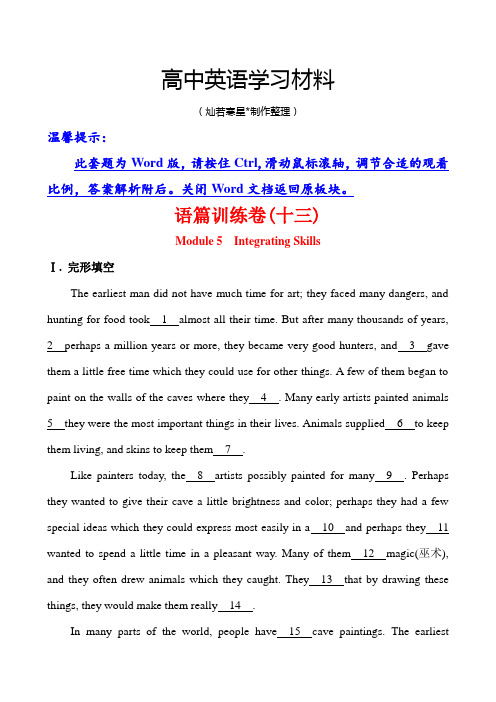
高中英语学习材料(灿若寒星*制作整理)温馨提示:此套题为Word版,请按住Ctrl,滑动鼠标滚轴,调节合适的观看比例,答案解析附后。
关闭Word文档返回原板块。
语篇训练卷(十三)Module 5Integrating SkillsⅠ. 完形填空The earliest man did not have much time for art; they faced many dangers, and hunting for food took1almost all their time. But after many thousands of years, 2perhaps a million years or more, they became very good hunters, and3gave them a little free time which they could use for other things. A few of them began to paint on the walls of the caves where they4. Many early artists painted animals 5they were the most important things in their lives. Animals supplied6to keep them living, and skins to keep them7.Like painters today, the8artists possibly painted for many9. Perhaps they wanted to give their cave a little brightness and color; perhaps they had a few special ideas which they could express most easily in a10and perhaps they11 wanted to spend a little time in a pleasant way. Many of them12magic(巫术), and they often drew animals which they caught. They13that by drawing these things, they would make them really14.In many parts of the world, people have15cave paintings. The earliestpaintings16we know about are in Europe. Because of the17weather, the earliest man in Europe used the caves for18; in many warmer parts of the world, this was not necessary. We know a lot about the19of the European paintings, and we believe that the earliest20were painted about thirty thousand years ago.1. A. away B. back C. out D. up2. A. even B. though C. and D. or3. A. which B. this C. what D. who4. A. ran B. worked C. lived D. hunted5. A. although B. becauseC. ifD. as if6. A. air B. fur C. food D. water7. A. comfortable B. warmC. beautifulD. healthy8. A. super B. early C. clever D. talented9. A. people B. places C. animals D. reasons10. A. painting B. word C. smile D. wall11. A. often B. quite C. just D. even12. A. believed in B. took advantage ofC. tried outD. begged for13. A. knew B. hopedC. understoodD. realized14. A. disappear B. appearC. missD. find15. A. searched B. looked forC. discoveredD. known16. A. which B. that C. when D. as17. A. sunny B. warm C. cool D. cold18. A. home B. houseC. shelterD. building19. A. names B. dates C. places D. shows20. A. that B. one C. it D. onesⅡ. 阅读理解A(2013·聊城高一检测)In Britain, some people say they will do anything if afamous person they love asks them to. One in three peoplein Britain have a new kind of disease—they love a famousperson too much.Some people love famous stars like Britney Spears, David Beckham or even Tony Blair. It is not just the young; grown-ups have the same problem. One in four people are so interested in their heroes that it affects(影响)their lives.There are two ways of worshipping(崇拜)famous people. One way is just to follow them or talk about them with friends for fun. The other is a more serious way. People have very strong feelings for them and think they are their friends. People who do so for fun are found to be happier. But those who have strong feelings for a famous person are perhaps to feel more lonely and worried.“Worshipping famous people is not certainly a bad thing, ”Dr John, an expert said. “But like many things, overdoing it may not always be good for you. ”1. From what some people say, we know.A. they are friends of the famous peopleB. famous people can pay them a lot of moneyC. they must go to the hospitalD. there is something wrong with their minds2. How many people in Britain have got this kind of disease?A. About one third.B. About a quarter.C. More than half.D. Just two or three.3. What does the writer think of the two ways of worshipping famous people?A. The first one is better.B. The second one is better.C. Both of them are good.D. Neither of them is good.4. People who have strong feelings for a famous person often feel worried because.A. they cannot become famous themselvesB. they think the famous person may not come to see themC. they are afraid the famous person may not like themD. they cannot get anything in return from the famous person5. Dr John tells us.A. worshipping famous people is a good thingB. anything overdone may bring some troubleC. famous people are not always friendly to usD. we mustn’t worship anybody or anythingB(2013·临沂高一检测) Jermaine Washington, 26, did something that amazes many people. He gave an important organ to a woman who he describes(描述)as “just a friend”.Jermaine met Michelle Stevens, 23, when they began working together in Washington DC. They used to have lunch with one another and chat during breaks. “He was somebody I could talk to. ”says Michelle. “One day, I cried on his shoulder.I had been on the kidney(肾)donor(捐赠者)waiting list for 11 months, and I had lost all hope. ”She told Jermaine how sad it was to spend three days a week, three hours a day, on a kidney dialysis(透析)machine. “I saw my friend dying before my eyes, ”Jermaine says. “What should I do?Sit back and watch her die?”Michelle’s mother, who was suffering from an illness, was unable to donate a kidney. Her two elder brothers were reluctant(不愿意的). “I understood, ”says Michelle, “They said they loved me very much, but they were just too afraid. ”The operation at Washington Hospital Center had a lot of painful procedures(步骤), but Jermaine never changed his decision and never regretted what he had done for Michelle.Today, both Michelle and Jermaine are fine. Three times a month, they get together for what they call a “thank-you lunch”. Though their friends hope they willget married, a romantic relationship is not what they want. “We are thankful for the beautiful friendship that we have, ”Michelle says. “We don’t want to mess up a good thing. ”6. According to the first paragraph, in many people’s opinion, Jermaine’s deed is very.A. braveB. surprisingC. acceptableD. stupid7. Why did Michelle tell Jermaine about her illness?A. Because Jermaine wanted to know everything about her.B. Because everybody else around her had already heard her sad story.C. Because Jermaine was someone with whom she could share her pain.D. Because she wanted to ask Jermaine to give his kidney to her.8. We learn that when Michelle’s brothers learnt about her illness, .A. they offered to help herB. they pretended not to know anythingC. they were unwilling to give their kidneys to herD. they lied that they could not donate their kidneys9. It is implied in the passage that.A. Michelle’s father died when she was youngB. Michelle is Jermaine’s only friend at workC. Michelle was always sure that she would find a kidney donorD. both Michelle and Jermaine just want to stay good friends10. Which of the following old sayings can summarize what Jermaine has done for Michelle?A. Actions speak louder than words.B. Where there is a will there is a way.C. A friend in need is a friend indeed.D. Many hands make light work.【拓展题型训练】Ⅰ. 情景对话(2013·西安高一检测) 根据对话情景和内容, 从对话后所给的选项中选出能填入每一空白处的最佳选项。
高一英语外研版必修3教案: Module5Period3 含解析 精
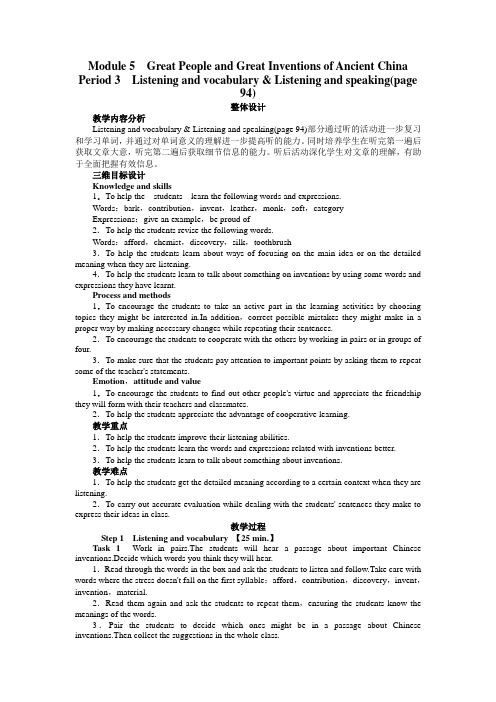
Module 5Great People and Great Inventions of Ancient China Period 3Listening and vocabulary & Listening and speaking(page94)整体设计教学内容分析Listening and vocabulary & Listening and speaking(page 94)部分通过听的活动进一步复习和学习单词,并通过对单词意义的理解进一步提高听的能力。
同时培养学生在听完第一遍后获取文章大意,听完第二遍后获取细节信息的能力。
听后活动深化学生对文章的理解,有助于全面把握有效信息。
三维目标设计Knowledge and skills1.To help the students learn the following words and expressions.Words:bark,contribution,invent,leather,monk,soft,categoryExpressions:give an example,be proud of2.To help the students revise the following words.Words:afford,chemist,discovery,silk,toothbrush3.To help the students learn about ways of focusing on the main idea or on the detailed meaning when they are listening.4.To help the students learn to talk about something on inventions by using some words and expressions they have learnt.Process and methods1.To encourage the students to take an active part in the learning activities by choosing topics they might be interested in.In addition,correct possible mistakes they might make in a proper way by making necessary changes while repeating their sentences.2.To encourage the students to cooperate with the others by working in pairs or in groups of four.3.To make sure that the students pay attention to important points by asking them to repeat some of the teacher's statements.Emotion,attitude and value1.To encourage the students to find out other people's virtue and appreciate the friendship they will form with their teachers and classmates.2.To help the students appreciate the advantage of cooperative learning.教学重点1.To help the students improve their listening abilities.2.To help the students learn the words and expressions related with inventions better.3.To help the students learn to talk about something about inventions.教学难点1.To help the students get the detailed meaning according to a certain context when they are listening.2.To carry out accurate evaluation while dealing with the students' sentences they make to express their ideas in class.教学过程Listening and vocabulary 【25 min.】Task 1Work in pairs.The students will hear a passage about important Chineseinventions.Decide which words you think they will hear.1.Read through the words in the box and ask the students to listen and follow.Take care with words where the stress doesn't fall on the first syllable:afford,contribution,discovery,invent,invention,material.2.Read them again and ask the students to repeat them,ensuring the students know the meanings of the words.3.Pair the students to decide which ones might be in a passage about Chinese inventions.Then collect the suggestions in the whole class.Task 2Listen to the passage in which five important inventions are described.Match the dates with the inventions.1.3.Play the tape again for them to answer.They can check with a partner.4.Collect the answers from the whole class.ANSWERSsilk-3200BC clock-1092AD paper-105AD printing-868AD toothbrush-1498ADTask 3Listen plete these sentences.1.Ask the students to read the sentence beginnings.Tell them to think about what might follow.1)The Chinese did not tell other countries ____________.2)However,we do know that in 1092AD he invented ____________.3)However,paper did not spread to other countries ____________.4)In 1041AD,a chemist called Bi Sheng invented ____________.5)This toothbrush could ____________.2.Play the tape again for them to write answers.They can check with their partners.3.Play the tape once more for the students to check and complete their answers.4.Collect the answers from the whole class.ANSWERS1)how silk was made2)the first real clock,3)for another 500 years4)a type of print that could move5)clean teeth quickly and wellListening and speaking(page 94)【18 min.】Task 1The pictures on page 94 show some ancient Chinese inventions.Match the objectswith their names.You can use a dictionary.1.Read through the words in the box and ask the students to listen and follow.compass fireworks matches porcelain umbrella wheelbarrow2.Read them again and ask the students to repeat them,ensuring the students know the meanings of the words.3.Pair the students to decide the meanings of the words.They can use a dictionary.4.Ask the students to match the objects with their names.They can check with a partner.5.Collect the answers from the whole class.ANSWERSa-wheelbarrow b-porcelain c-matches d-fireworks e-compass f-umbrellaTask 2Work in pairs.Read these statements and try to guess which objects in the pictures they describe.1.Read the statements,ensuring the students know the meanings of the statements.1)The first ones existed 2,000 years ago.2)It was first made during the Eastern Han Dynasty between 25 AD and 220 AD.3)It was invented by an army general called Zhuge Liang(诸葛亮).4)It was first used on a boat by Zheng He from Yunnan in the 15th century.5)The early ones were used to protect against the sun.6)They say that the first ones were made during the Qin Dynasty in the third century BC.7)Today they are light and they only have one wheel.8)It wasn't made in Europe until the 16th century.9)The first factory was at Xiaoxiantan in Zhejiang Province.10)They were made of silk.2.Ask the students to decide their choices.They can check with a partner.3.Collect the answers from the whole class.Task 3Listen to an interview with a historian and match the statements in activity 11 with the objects.Write the number of the statement by the name of the object.wheelbarrow ____________umbrella ____________porcelain ____________compass ____________1.Ask the students to read the words.Tell them to think about what they might choose.2.Play the tape for them to write answers.They can check with a partner.3.Play the tape once more for the students to check and complete their choices.4.Collect the answers from the whole class.ANSWERSwheelbarrow 3,7umbrella 1,5,10porcelain 2,8,9compass 4,6Making a summary 【2 min.】Summarise the whole period.First,emphasise the skills of listening—predicting the answers,guessing the meaning of a new word by context and taking notes.Then ask the students to pay attention to focusing on the general idea and then getting some specific information as stly,emphasise the way to talk about inventions.HomeworkAsk the students to go through Everyday English.教学参考One Great Invention of Ancient China — GunpowderThe invention of gunpowder had a close relationship with the advanced ancient workmanship of smelting industry.People began to know a lot of chemistry knowledge about the nature of different mineral materials during the process of smelting operation.With the knowledge,ancient necromancers tried to seek the elixir of immortality from certain kinds of ores and fuel.Although they failed to get what they were looking for,they discovered that an explosive mixture could be produced by combining sulfur,charcoal,and saltpeter(potassium nitrate).This mixture finally led to the invention of gunpowder although its exact date of invention still remains unknown.Many historical materials indicate that gunpowder first appeared before the Tang Dynasty(618AD-907AD).From 300AD to 650AD several recipes were written about inflammable mixtures.Some historians date the invention of gunpowder at 850AD when a Taoist book warned of three specific elixir formulas as too dangerous to experiment.The military applications of gunpowder began in the Tang Dynasty.Explosive bombs filled with gunpowder and fired from catapults were used in wars.During the Song and Yuan dynasties (960AD-1368AD),the military applications of gunpowder became common and some other weapons like “fire cannon”,“rocket”,“missile” and “fireball” were introduced.In the Yuan Dynasty (1279AD-1368AD),the method of powder-making was introduced to the Arab world and Europe,bringing a series of revolutions to weapon manufacturing,as well as to stratagem and tactics on the battlefield.From Italy the making of gunpowder soon spread to other European countries,and by the 1350s it had become an effective weapon on the battlefield.。
外研社必修三Module5教案电子教案.docx

外研社必修三Mod ul e5 教案科目Teaching ContentTeaching Objectives学习—————好资料Teaching Plan英语年级高一教师许宝玉Book 3 : Module 5 Great People and Great Inventions of Ancient China( Reading and Vocabulary)1. Knowledge aims:(1)To help students understand the words and some useful expressions(2)To get the students have a better understanding of the text( 3)To train the students’ ability of guess words’ meaning by read the sentence (4)Learn to introduce a great person from some aspects---names and thoughts2. Language ability aims:Theoretical basis: High school English curriculum standards emphasize the ability toacquire and process information in English1). Can get the main information from the article and extract the main points2). Can understand the subject of the article, the author's intention3). Can extract, filter and reorganize the information in the article4). Can use the context to guess new words(1)Learn to read with some reading strategies(2) Improve students ’ integrated abilitiesspeakingof and reading(3)Learn to introduce a great philosopher.3.Learning strategy aims:Vocabulary classificationEffective self-regulation during reading, English interaction, and task completion. Obtain relevant information through various channels, identify and apply effective resources.4.Cultural awareness and emotional attitude:To get the students learn more about the great people and great inventions of ancientChina 5. Teaching important points1.Know the pronunciations of new words. For the students, know the pronunciations of the words are really important. Only if they know them clearly, can they understand the words exactly.2. Talk about the great people and great inventions of ancient China. Get the general information about the great people, such as Confucius, Mozi and Mencius.学习—————好资料Teaching Material and Students Analysis 6. Teaching Difficult Points1.How to describe a great person. Description is difficult for the students; the teacher shouldguide them to introduce the person from some aspects. For example, the teacher can ask the students to describe the person from these aspects: names, birthplace,and thoughts.2.Let the students understand the passage better and let them grasp key words and phrases.The content of my lesson is Module 5 in New Standard English Book 3. This module is aboutthe Great People and Great Inventions of Ancient China. It introduces three famous people inChina. They are Confucius, Mozi and Mencius. By studying of this unit, we ’ ll enable students to know more about the great people and great inventions in ancient China. At the same time,let the students learn how to describe a person. Students in grade one in senior high school. /Average class/ They haven ’ t completely changed their smethodofstudying and cannotinvolve themselves in the class activities fully. They have difficulty in expressing themselvesin English clearly. Some students are not very interested in English.Teaching Aid Teaching ProcedureLead –in Pre-reading Blackboard; A recorder; Computer; A projectorThe teacher’ s activityShow Ss some pictures of great people in China and in theworld and ask them who is your most admired or respectedgreat people of China ?Task 1:Complete the gaps with the words in the box onpage41.Then ask individuals to show their answers.equal philosopher thinker treat state rulerphilosophy teachings war look afterTask 2:Q1: Do you know any philosopher of ancient China?Guess the people by what they said.Q2: Look at the pictures and answer thefollowingquestions.The students’purposeactivityStudents need to havLead ina brain-storm and 3minsspeakloudly.The students8minsdivide Strengthenthemselves into basisgroups andwork togetherand give out theanswers.Ss can have avivid and afurtherunderstanding学习—————好资料Who is he? What was his main idea?of the personPre-and keep their learninginterest inlearning.Task 3:While –reading Read these statements and tick the ideas that Confuciustaught.Skimming:Task 1:Ss should read the material fast to find the words andphrases in the passage that match these definitions. Task 2:Ask students to read the passage as quickly as they can,then read questions on the screen and choose the correctanswers.Students readthe sentencesand make achoice.The studentsread the 25minspassagecarefully andgive out theanswers.Scanning:Task 1. (Individual work)Ask Ss to read the three parts carefully and fill in theblanks. And teacher will check the answers.DeeperlearningThe studentsfinish the taskcarefully anddiscuss witheach other, andthen share theideas.学习—————好资料Task 2. (Individual work )Ask Ss to read the the passage again and decide if these following sentences are true or false.1.Confucius lived in a country where there was no wara long time ago.2.Confucius was a philosopher whose influence has been the greatest for more than 2000 years.3.Mencius was a student taught by Confucius.4.Some rulers followed the advice which was given by Mencius.5.Mozi was a man who lived an unusual life.Task 3. ( Group work)Ask Ss to read the the sentences carefully and try to translate them into Chinese. They can finish it in the form of group.Summary The studentsread the Improve passage and the Reading questions again Skillsandfinish the taskon their own.consolidationTask 1: Discussion these questions.Which of the following opinions do you think is the mostimportant? And why?(1)All men are equal.Post- reading(2)Kindness and love.(3)Peace.Task 2:Peace is quite important. Peace and development are thetwo subjects of our modern world. In history, wars haveLinkingtheknowledge Students need learned withreal life and to organize infiltrating their language the concept of and words andmoraleducation to give a brief help students answer.establish acorrectoutlook onlife, enhancesocialresponsibility,学习—————好资料caused great damage to people. Many people lost their lives,many people became homeless, and people led a hard andpoor life. People all over the world wants a peacefulenvironment.Anybody can help others with a willing heart. Let’ s try our best to lend others a helping hand and work hand inhand to create a harmonious society.and comprehensiv ely improve humanistic quality.8minsWrite a passage about a person you admire most or you well know and introduce he or she from some aspects in Homeworkthe writing paper. Hand in before next class.Assignment Students need Deepento get enough students' information overall about the the impression of person and the text finish acompositionbased on that.2mins。
外研版高中英语必修三教案Module5GreatpeopleandGreatInventionsofAncientChina
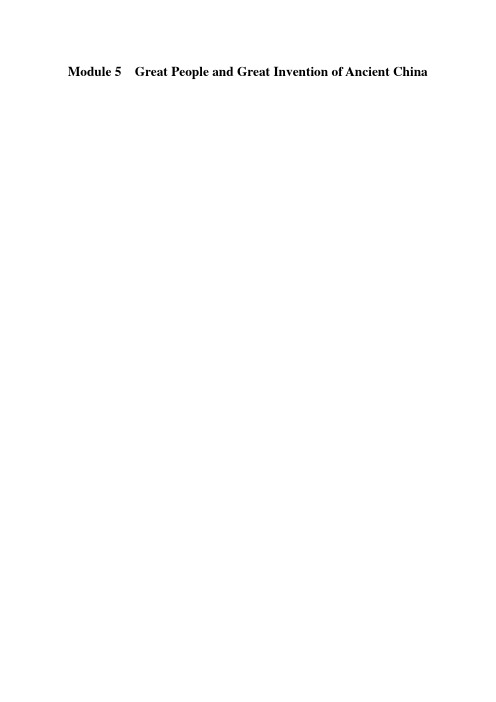
Module 5 Great People and Great Invention of Ancient ChinaPart One Teaching Design第一部分教学设计Period 1 Reading—Philosophers of Ancient China■Goals●To learn to read passages with defining relative clauses about Philosophers of Ancient ChinaTo learn to read with strategies■ProceduresStep 1: Warming up by defining philosopherA philosopher is a person devoted to studying and producing results inphilosophy. The word, “philosopher,” literally means “lover ofwisdom.”Warming up by discussing some philosophical sentences from theAnalects of Confucius子曰:“学而时习之,不亦说乎?有朋自远方来,不亦乐乎?人不知而不愠,不亦君子乎?”The Master said: “Is it not pleasant to learn with a constant perseverance ([ ☐☜♦♓❖♓☜❒☜⏹♦] 坚定不移)and application? Is it not delightful to have friends coming from distant quarters? Is he not a man of complete virtue, who feels no discomposure ([♎♓♦☜❍☐☜◆✞☜] 心乱, 狼狈, 不安)though men may take no note of him?”子曰:“温故而知新,可以为师矣。
- 1、下载文档前请自行甄别文档内容的完整性,平台不提供额外的编辑、内容补充、找答案等附加服务。
- 2、"仅部分预览"的文档,不可在线预览部分如存在完整性等问题,可反馈申请退款(可完整预览的文档不适用该条件!)。
- 3、如文档侵犯您的权益,请联系客服反馈,我们会尽快为您处理(人工客服工作时间:9:00-18:30)。
高中英语学习材料***鼎尚图文理制作***Period Three Integrating SkillsⅠ.语境填词1.Chairman Mao made a great ________ (贡献) to the revolution of China.2.Bell ________ (发明) the telephone in 1876.3.This kind of cloth feels ________ (软的).4.The ________ (皮革) shoes made in this factory are very famous.5.There are different ________ (种类) of food sold in this shop.6.We’ve never doubted her ________ (诚实).7.All men should be treated with ________ (公平).8.We had an ________ (辩论) about politics.9.The people there are fighting to gain their ________ (自由) from foreign control.10.They are trying to find a cleaner ________ (燃料) for cars.Ⅱ.完成句子1.Everyone should have ________________________ (责任感) for his work and his family.2.List the events ________________________ (按重要性的顺序).3.Have you ________________________ (得出结论) from the experiment?4.Can you ________________________ (举出一个例子) of what you mean?5.Is the clock ________________________ (报时)?6.At first,the train ran ________________________ (和马一样不快).Ⅲ.同义词辨析1.用invent或discover的适当形式填空(1)Who ________ the steam engine?(2)Columbus ________ America in 1492.(3)He ________ a new teaching method.2.用condition或situation填空(1)You can borrow my bike on ________ that you return it on time.(2)We are in a difficult ________.(3)Do exercise every day and you’ll be back ________________________.Ⅳ.单项填空1.The conclusion they ________ at the meeting is satisfactory.A.got to B.arrived inC.reached D.draw2.—I don’t believe that John can remember what the robber was like.—You’re quite wrong.I know it was dark,but he ________ the robber’s face—I’m sure of it!A.did see B.was seeingC.had seen D.would see3.The board are discussing the possible ________ they can take of the present economic situation.A.notice B.advantageC.use D.best4.Everyone is encouraged to ________ food and clothing for the refugees.A.take B.giveC.contribute D.afford5.If you have a very good ________ of direction,you’ll not get lost anywhere.A.sense B.ideaC.feeling D.experience6.Let’s go to the chemist’s ________ we can get the medicine we need.A.what B.whereC.that D.which7.My teacher usually ________ me on my English study.A.tells B.teachesC.advises D.encourages8.In ________,we should like to thank all those who have worked so hard to bring about this result.A.last B.endC.ending D.conclusion9.In order to prove the servant’s ________,she left a bag containing money on the table.A.anger B.natureC.surprise D.honesty10.The landmass had been ________ before the telephone was ________.A.discovered;inventedB.invented;discoveredC.found out;discoveredD.invented;found outⅤ.完形填空Pete Rose,the famous baseball player,whom I have never met before,taught me something so valuable that __1__ my life.Pete was being __2__ in spring training the year when he was about to break Ty Cobb’s hits record.One __3__ shouted suddenly,“Pete,you only need 78 hits to __4__ the record.How many at-bats (击球) do you think you’ll need to __5__ the 78 hits?” Pete just stared at the reporter and said,“78.” The reporter __6__ back,“Ah,come on,Pete.You don’t expect to get 78 hits __7__ 78 at-bats,do you?”Mr.Rose __8__ shared his belief with the crowd of reporters who were anxiously __9__ his reply to this seemingly __10__ statement. “Every time I step up to the plate,I expect to get a hit!”“If I go up hoping to get a hit,” he __11__,“then I probably really get a hit.It is the positive __12__ that has got me all of the hits in the first place.”Wh en I thought about Pete Rose’s belief and __13__ it was used in everyday life,I felt a little __14__.As a business person,I was hoping to make my sales quotas (配额).As a father,I was hoping to be a good dad.As a(n) __15__ man,I was hoping to be a good husband.The __16__ was that I was a(n) __17__ salesperson,I was not so bad of a father,and I was an okay husband.I immediately __18__ that being okay was not enough!I wanted to be a great __19__,a great father and a great husband.I changed my attitude to one of positive expectations,and the __20__ were amazing.I was fortunate enough to win a few sales trips,I won Coach of the Year in my son’s baseball league,and I share a loving relationship with my wife.Thanks,Mr.Rose!1.A.shaped B.enrichedC.ruled D.changed2.A.trained B.interviewedC.visited D.invited3.A.player B.teacherC.reporter D.student4.A.keep B.breakC.limit D.report5.A.get B.chooseC.finish D.accept6.A.shouted B.lookedC.turned D.came7.A.at B.onC.in D.with8.A.angrily B.cheerfullyC.anxiously D.calmly9.A.waiting for B.writing downC.talking about D.thinking of10.A.unusual B.sillyC.great D.different11.A.replied B.continuedC.explained D.concluded12.A.expectation B.imaginationC.instruction D.suggestion13.A.when B.whereC.how D.why14.A.worried B.unhappyC.nervous D.embarrassed15.A.experienced B.marriedC.busy D.cool16.A.reason B.puzzleC.problem D.truth17.A.ordinary B.successfulC.famous D.fortunate18.A.imagined B.knewC.decided D.agreed19.A.boss B.sportsmanC.salesman D.worker20.A.prizes B.hitsC.scores D.resultsnot only...but also...不但……而且……1.He can speak not only English but also French.他既能讲英语也能讲法语。
